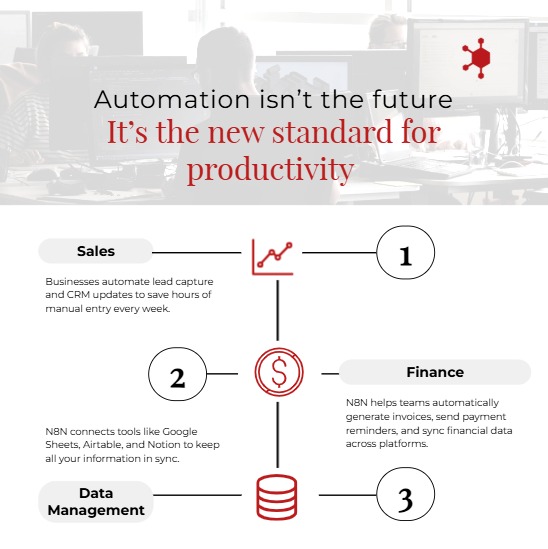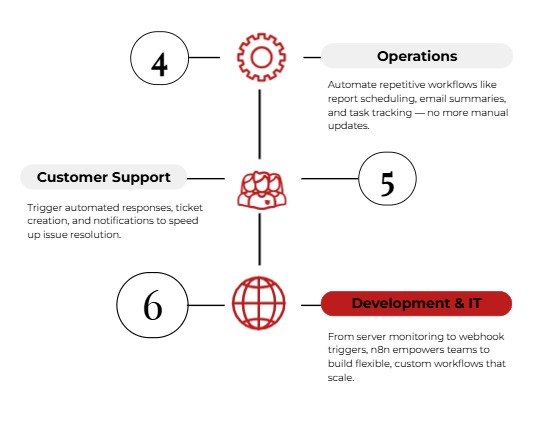How Automation Transforms Modern Business Operations: A Complete Guide for Decision-Makers
October 13, 2025
In today's hyper-competitive digital economy, speed and efficiency aren't just advantages--they're survival requirements. Businesses that can operate leaner, respond faster, and scale smarter consistently outperform competitors bogged down by manual processes.
Automation is the driving force behind this transformation. It's more than replacing manual work with technology; it's about creating intelligent workflows that connect tools, transfer data seamlessly, and execute actions automatically.
According to industry research, businesses adopting automation experience up to 30% productivity improvement, reduced operational costs, and higher employee satisfaction. In 2025 and beyond, automation is no longer optional--it's a business necessity for organizations of all sizes.

The Benefits of Automation for Businesses
1. Increased Productivity and Efficiency
Automation dramatically accelerates routine tasks like data entry, report generation, and file management--turning hours of work into seconds. This efficiency allows teams to focus on creative, high-impact tasks that drive growth. Once automated, these workflows continue delivering results every day without extra effort.
2. Cost Savings and Resource Optimization
Automation directly cuts labor costs by minimizing time spent on repetitive work. The real value, however, lies in reallocating human talent toward strategic goals.
For example, automating a finance team's 15-hour weekly invoice process frees over 700 hours annually for planning and analysis--significantly boosting ROI.
3. Improved Accuracy and Reduced Human Error
Human error is inevitable in repetitive data handling. Automation eliminates inconsistencies by ensuring tasks are performed exactly the same way every time. This reliability is critical for functions like financial reporting, compliance, and data management.
4. Enhanced Customer Experience
Customers today expect instant responses and smooth interactions. Automation enables real-time reactions--personalized emails, order updates, and ticket routing happen automatically. This leads to faster response times, stronger trust, and higher satisfaction.
5. Scalability and Flexibility
Manual workflows struggle as businesses grow. Automated systems, however, scale effortlessly--from 10 customers to 10,000--with no increase in overhead. Automation also allows businesses to pivot quickly and adapt to changing market conditions.
Real-World Applications of Automation
- Sales and CRM: Automation scores leads, updates CRM entries, assigns sales reps, and sends personalized follow-ups--all in real time. Sales teams spend more time closing deals instead of managing admin work.
- Finance and Accounting: Automated invoice processing, expense approvals, and reconciliations streamline accounting workflows. This not only reduces errors but also speeds up financial reporting cycles.
- Marketing: Marketing automation platforms orchestrate email campaigns, social media posts, and customer nurturing based on user behavior. Businesses ensure the right message reaches the right customer at the right moment.
- Customer Support: Ticketing systems automatically categorize, route, and escalate issues. Chatbots handle common queries instantly, ensuring 24/7 availability and consistency.
- Operations and Logistics: Automation optimizes inventory tracking, order management, and shipping notifications. Stock levels update automatically, and customers stay informed through every delivery stage.
- IT and DevOps: Automated monitoring, backups, and deployment pipelines enhance reliability while freeing technical teams to focus on innovation and security improvements.

Introduction to n8n: Empowering Customizable Workflow Automation
With growing awareness of automation's power, businesses are now asking: Which tool makes implementation simple, scalable, and affordable?
One standout solution is n8n--an open-source workflow automation platform that connects hundreds of apps and services without requiring deep coding knowledge.
Think of n8n as your business's digital glue--linking CRMs, spreadsheets, marketing tools, and databases to work together seamlessly.
Why Businesses Choose n8n:
- Open-Source & Self-Hosted: Total control over data, ideal for security-conscious or regulated industries.
- 400+ Integrations: Connects with tools like Slack, Google Workspace, Salesforce, and more.
- Visual Workflow Builder: Drag-and-drop interface accessible even to non-developers.
- Fair Pricing: Transparent costs with no per-execution fees when self-hosted.
- Customizable Logic: Supports complex, conditional workflows and custom code when needed.
How Automation with n8n Transforms Daily Operations
1. Eliminating Repetitive Work
A closed deal can automatically create CRM records, notify the onboarding team, generate folders, and update dashboards--all triggered by one change in deal status. What once took 15 minutes now happens instantly.
2. Building Intelligent Workflows
n8n supports complex logic--such as routing tickets by urgency or escalating issues automatically if response times exceed thresholds. This intelligence brings efficiency and accountability.
3. Breaking Down Data Silos
Businesses often suffer from fragmented information across systems. n8n integrates these platforms, ensuring real-time synchronization and consistent data across departments.
4. Empowering Employees
Automation doesn't replace people--it frees them. Employees shift from manual entry to creative problem-solving and strategic planning, increasing morale and reducing burnout.
5. Enabling Strategic Agility
Automated workflows adapt quickly to change. As markets evolve, businesses using n8n can pivot faster than competitors relying on manual adjustments.
Challenges and Considerations in Implementing Automation
1. Initial Setup and Investment
Automation requires an upfront commitment in tools and planning. However, most businesses recover costs quickly through efficiency gains.
2. Identifying Suitable Processes
Start with rule-based, repetitive tasks. Complex or creative processes may require simplification before automation.
3. Training and Change Management
Even intuitive tools like n8n require onboarding. Build internal "automation champions" who guide teams and promote adoption.
4. Overcoming Resistance
Employees may fear job loss. It's crucial to communicate that automation enhances their work by removing tedious tasks--not replacing them.
5. Maintenance and Updates
Workflows evolve as business processes change. Document workflows clearly and review them periodically to maintain reliability.
6. Security and Compliance
For sensitive data, enforce strict access controls and compliance measures. Self-hosted automation tools like n8n help maintain full data governance.
Conclusion: Automation as a Competitive Necessity
Automation is no longer a futuristic idea--it's a present-day imperative. Businesses adopting automation gain measurable advantages in speed, cost-efficiency, customer experience, and employee engagement.
Tools like n8n democratize automation, giving startups and enterprises alike the flexibility to build intelligent, interconnected workflows without heavy investment.
To get started:
- Identify repetitive, high-impact processes.
- Automate small, measurable tasks first.
- Gradually expand to cross-departmental workflows.
Every manual process left unoptimized is a lost opportunity. The future belongs to companies that work smarter--not harder.
The automation revolution is here. The question isn't if your business should automate--it's how soon you'll start.
Ready to Transform Your Digital Presence?
Discover how Lanora can help elevate your business to new heights.